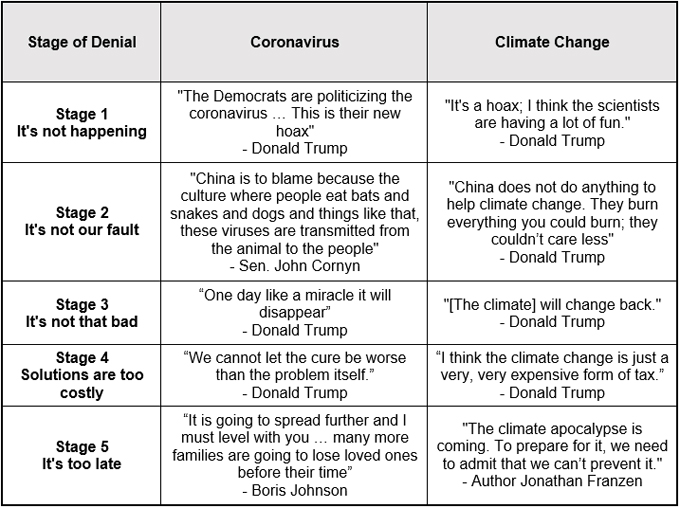
So, these coronavirus denials echo those of the climate crisis
It’s not a coincidence, and those in the climate fight have seen it before.
The weather is beautiful, the sun is out and people are resuming (somewhat) normalcy with parks, outdoor dining, and hitting the salons again.
It’s almost like there isn’t a deadly pandemic out there, eh?
In case you missed it, coronavirus cases are holding steady in Philadelphia. But at times, I’ve begun to question if I’m the only one left still taking precautions.
However, this new state feels eerily familiar. As a climate advocate, we’re in a point in the quarantine where our current moment feels a lot like the climate crisis. We know there’s a big scary problem out there, but it’s most likely separate from us… until it isn’t.
So of course, I took to Twitter for a string.
Here’s how our two current crises are more similar than we may expect.
Seven ways our coronavirus response echos that from climate change.
1. Experts say there’s a problem. Yet people deny it.
Interest groups (like the American Petroleum Institute) have launched counter-attacks on science dating back to 1950. The OG fight was over smog in LA, when the Petroleum Institute highlighted the uncertainty of the science.
In current times, conspiracy theorists launched a COVID-19 smear campaign against Dr. Anthony Fauci.
2. COVID-19 denial stages parallel the climate denial handbook. It’s not a coincidence.
First, deny that it’s happening. Then place the blame on someone else, say how it’s not that bad, talk about how expensive solutions are (although solving the problem will be cheaper in the long run) and then say how we’ve missed our chance.

The climate denial began in the 1980s, which gave us over 25 years to get a head start of where we are now.
However, it’s not too late for either crisis… if we get our act together.
3. This somehow warped into a political issue.
Now, wearing a mask has become a political issue. Grown adults throw tantrums in Costco to avoid wearing a mask.
Yet viruses, like the climate, don’t care about political parties.
4. Americans feel useless about being a part of the solution. So they throw in the towel.
If you feel like you can’t do anything to solve the bigger problem, fatigue and adaption overcome our desire to participate in solutions.
“That might be what’s going on with the coronavirus — people don’t feel like they have agency on a collective level, because the government is not doing anything, so their response is to say, ‘well, I gotta live my life’,” as UC-Davis environmental economist Frances Moore told Vox.
Like coronavirus, the solutions to climate change – which already exist and are in our power – appear to be too difficult for an individual. Similar to: “my carbon footprint is a blip in the grand scheme of things, so why does one SUV matter;” it’s easy to see how one mask, restaurant or gym visit may be appealing.
5. Shifting baselines mean we start to forget that this isn’t normal.
It’s really hot in Philly, ain’t it? Did you know that ‘extremely hot summers’ are 200 more times likely now than they were just 50 years ago?
Trump’s response that American deaths from COVID-19 are inevitable is a continuing trend since he took office, incrementally making extreme things look normal.
Climate change and Americans dying from a pandemic are not normal.
6. Americans are concerned and want the federal government to do more on climate change and coronavirus.
Although the coronavirus is running rampant, almost two-thirds of Americans want the federal government to act aggressively to fight climate change, which 60% view as a major threat.
With 69% of Americans concerned about coronavirus infection, almost 60% disapprove of Trumps’ response to the outbreak.
7. Both COVID-19 and climate change disproportionately affect black and brown communities.
Coronavirus rates are more than three times higher for Latinx people and more than two-and-a-half times higher for Black people than they are for white people according to the New York Times. Trump’s coronavirus response has largely left out essential workers, which are a large part of people of color.
Republicans have delayed action for climate change for years, starting with Ronald Reagan’s White House solar panels removal and administration’s denial of global warming.
Want to learn more about the parallels between climate and corona? Listen to the following Hot Take Podcast episode that I discovered during my (socially distant) drive to a hike.









